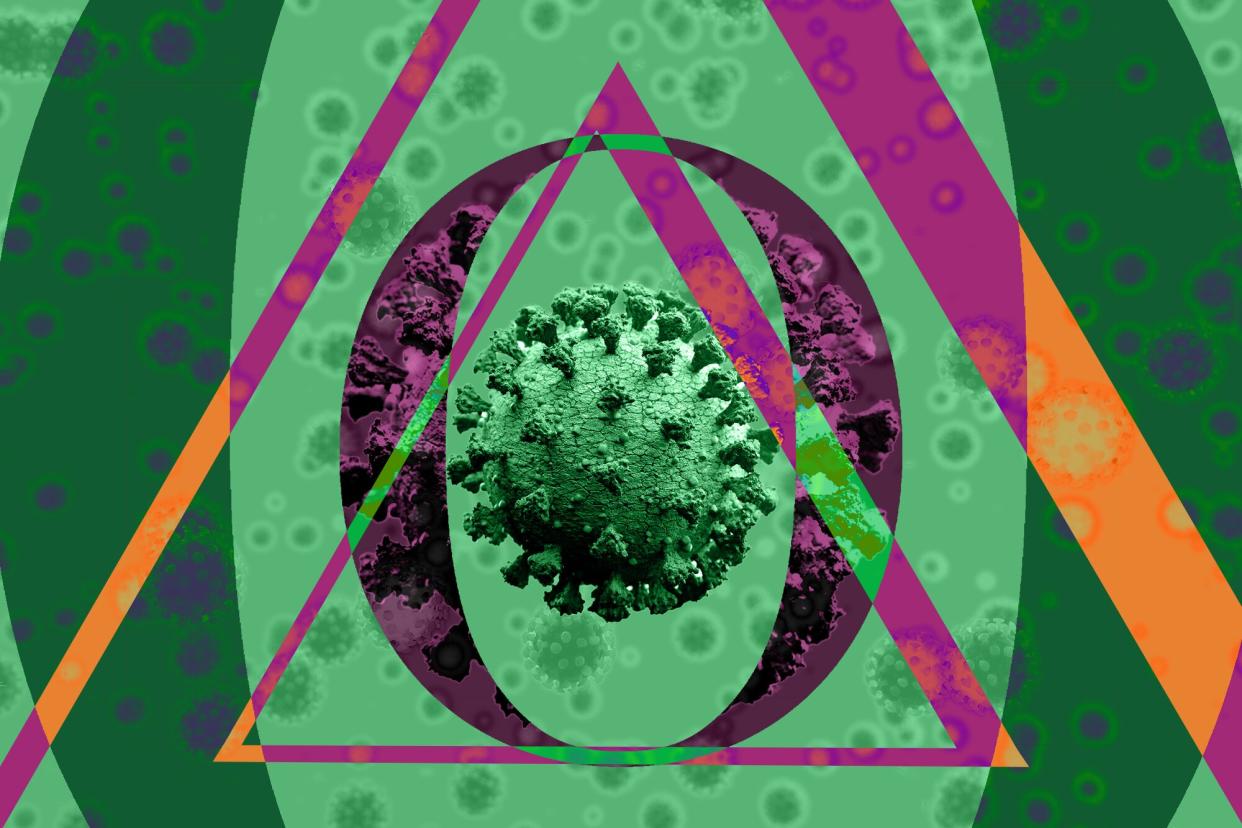What the Heck Is 'Deltacron' — and Should You Be Worried?

- Oops!Something went wrong.Please try again later.
Getty Images - Design: Alex Sandoval
From new COVID-19 variants seemingly popping up on the regular to the possibility of catching "flurona" (aka the flu and COVID at the same time) — all while cases continue surging nationwide — the last thing you likely want to hear is news about a reported new thing called "Deltacron" that reportedly combines (you guessed it) Delta and Omicron.
The good news is, so far, it seems "Deltacron" is much ado about nothing. Here's the scoop: Researchers in the island country of Cyprus recently found a combined strain of Delta and Omicron, according to Bloomberg News. It was dubbed "Deltacron" because they ID-ed genetic markings similar to Omicron within genomic sequencing of strains of Delta. The combined strain was discovered in 25 cases, according Leondios Kostrikis, professor of biological sciences at the University of Cyprus and head of the Laboratory of Biotechnology and Molecular Virology, as reported by Bloomberg. They then sent the data to GISAID, the international database that tracks changes in the virus, for further research. Kostrikis said he believes the combo strain will be displaced by the much more prevalent Omicron well before it even takes off (similar to the IHU variant out of France, which luckily hasn't shown signs of rapid spread).
Naturally, this ~fun~ discovery began making global headlines — but just as quickly, health experts took to Twitter to assuage panic and settle nerves. Krutika Kuppalli, M.D., FIDSA, infectious disease doctor who serves on the World Health Organization's COVID-19 technical team, tweeted that the dual strains "did NOT form a super variant," adding, "this is likely sequencing artifact (lab contamination of Omicron fragments in a Delta specimen)."
Okay people let’s make this a teachable moment, there is no such thing as #Deltacron (Just like there is no such thing as #Flurona) #Omicron and #Delta did NOT form a super variant
This is likely sequencing artifact (lab contamination of Omicron fragments in a Delta specimen) https://t.co/DDvM24bt9g— Krutika Kuppalli, MD FIDSA (@KrutikaKuppalli) January 9, 2022
She wasn't the only one calling it a potential lab error. Thomas Peacock, Ph.D., a virologist at Imperial College London also tweeted that the discovery was "clearly contamination" and attributed it to the lab results of those 25 patients being inadvertently merged together. He explained that, to determine if something is a true combined variant, there would ideally be "multiple sequencing labs finding the same recombinant/homoplasy independently (or at least on different sequencing runs)." With both Delta and Omicron now so prevalent in so many areas, Peacock notes it's entirely possible the lab results were accidentally contaminated, adding, "this literally happens to every sequencing lab occasionally." (Read more: Why Are the New COVID-19 Strains Spreading More Quickly?)
Molecular biologist Eric Topol, M.D., founder and director of the Scripps Research Translational Institute even called Deltacron a "scariant," adding that it's "one less thing to worry about."
Small update: the Cypriot 'Deltacron' sequences reported by several large media outlets look to be quite clearly contamination - they do not cluster on a phylogenetic tree and have a whole Artic primer sequencing amplicon of Omicron in an otherwise Delta backbone.
— Tom Peacock (@PeacockFlu) January 8, 2022
And in case you want more proof than the medical chatter happening on Twitter (fair), there's also Chicago-based internal medicine physician Vivek Cherian, M.D., who tells Shape that there's genuinely no need to panic or worry about the creation of some super virus. "Based on the information currently available, it seems more likely that it may be a contamination as opposed to a combination of the Delta and Omicron variants."
That doesn't mean it's not possible two variants won't combine in the future, notes Dr. Cherian, but as of right now, this really is one worry you can check off the mental stress list. "Because COVID transmission around the world is exceedingly high at this point in time, the chance of recombination is always there, but only time will tell whether that ultimately will lead to other variants that are more transmissible and virulent" (aka contagious and severe). (Read more about the COVID-19 Omicron variant here.)
"Bottom line: We have effective vaccines available and our goal should be to get as many people vaccinated as soon as humanly possible — not only in the United States but around the globe," says Dr. Cherian. "We want to create as many dead ends as possible for this virus, therefore limiting its ability to spread and mutate into a potential variant that we truly would need to be concerned about in the future."
Given that the current vaccine and booster recommendations provide ample protection against severe illness from current variants, staying up-to-date on vaccines — as well as wearing masks with two or more layers when around other people, frequent hand-washing, and social distancing — are the best ways to prevent any sci-fi movie super variants from brewing in the first place.
The information in this story is accurate as of press time. As updates about coronavirus COVID-19 continue to evolve, it's possible that some information and recommendations in this story have changed since initial publication. We encourage you to check in regularly with resources such as the CDC, the WHO, and your local public health department for the most up-to-date data and recommendations.

